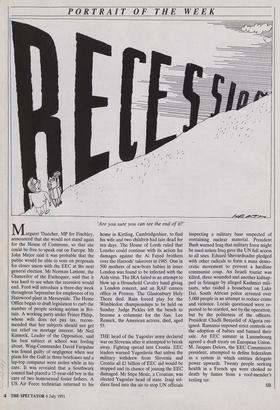PORTRAIT OF THE WEEK
`Are you sure you can see the end of it?' Margaret Thatcher, MP for Finchley, announced that she would not stand again for the House of Commons, so that she could be free to speak out on Europe. Mr John Major said it was probable that the public would be able to vote on proposals for closer union with the EEC at the next general election. Mr Norman Lamont, the Chancellor of the Exchequer, said that it was hard to see when the recession would end. Ford will introduce a three-day week throughout September for employees of its Halewood plant in Merseyside. The Home Office began to draft legislation to curb the number of people seeking asylum in Bri- tain. A working party under Prince Philip, whose wife does not pay tax, recom- mended that her subjects should not get tax relief on mortage interest. Mr Neil Kinnock, Leader of the Opposition, said his best subject at school was fooling about. Wing-Commander David Farquhar was found guilty of negligence when war plans for the Gulf in three briefcases and a lap-top computer were stolen while in his care. It was revealed that a Southwark council had placed a 15-year-old boy in the care of two homosexual foster fathers. A US Air Force technician returned to his home in Kirtling, Cambridgeshire, to find his wife and two children had lain dead for ten days. The House of Lords ruled that Lonrho could continue with its action for damages against the Al Fayed brothers over the Harrods' takeover in 1985. One in 500 mothers of new-born babies in inner London was found to be infected with the Aids virus. The IRA failed in an attempt to blow up a Household Cavalry band giving a London concert, and an RAF careers office in Preston. The Glastonbury Holy Thorn died. Rain forced play for the Wimbledon championships to be held on Sunday. Judge Pickles left the bench to become a columnist for the Sun. Lee Remick, the American actress, died, aged 55.
THE head of the Yugoslav army declared war on Slovenia after it attempted to break away. Fighting spread into Croatia. EEC leaders warned Yugoslavia that unless the military withdrew from Slovenia and Croatia all £1 billion of EEC aid would be stopped and its chance of joining the EEC damaged. Mr Stipe Mesic, a Croatian, was elected Yugoslav head of state. Iraqi sol- diers fired into the air to stop UN officials inspecting a military base suspected of containing nuclear material. President Bush warned Iraq that military force might be used unless Iraq gave the UN full access to all sites. Eduard Shevardnadze pledged with other radicals to form a mass demo- cratic movement to prevent a hardline communist coup. An Israeli tourist was killed, three wounded and another kidnap- ped in Srinagar by alleged Kashmiri mili- tants, who raided a houseboat on Lake Dal. South African police arrested over 5,000 people in an attempt to reduce crime and violence. Locals questioned were re- ported to be startled, not by the operation, but by the politeness of the officers. President Chadli Benjedid of Algeria res- igned. Rumania imposed strict controls on the adoption of babies and banned their sale. An EEC summit in Luxembourg agreed a draft treaty on European Union. M. Jacques Delors, the EEC Commission president, attempted to define federalism as a system in which entities delegate power upwards. Twenty people seeking health in a French spa were choked to death by fumes from a roof-mender's boiling tar.
SB


















































 Previous page
Previous page